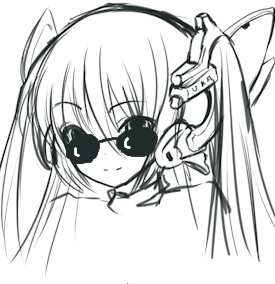
Written by A. H. on 22 Mar 2011
If we had a penny for every time we heard the phrase "the new Miyazaki" attributed to a particular director or individual... well, we'd probably have around twenty pence by now. Regardless, Hayao Miyazaki comparisons tend to come far more frequently and indiscriminately in the world of anime than we might like, often putting undue pressure upon those on the receiving end of such praise to somehow conform to the concept of what a "Miyazaki-esque" creation should be and how it should look.
Amongst all of those tagged with the "next Miyazaki" moniker however, there is one that stands out from the crowd as a potential contender to the crown - a man who himself has an intriguing relationship with Studio Ghibli, and an individual with enough strong concepts and interests of his own to shake off any shackles that may come from those Miyazaki comparisons. That man is Mamoru Hosoda, and on the cusp of Summer Wars' UK release what better time is there to delve into this notable anime director and his career thus far?
Mamoru Hosoda was born on September 19th 1967, in the Nakaniikawa District of Toyama, an industrial prefecture on the Japan Sea coast a little over three hours train ride from Tokyo. From growing up in this region, Hosoda went on to study oil painting at the Arts and Crafts department of Kanazawa University in Ishikawa prefecture, a region of Japan renowned for its arts and crafts and a clear statement of intent as far as Hosoda's creative bent goes.
Thankfully, it was to be the anime industry who would benefit from Mamoru Hosoda's artistic ability, with Toei Animation the company largely responsible for entering Hosoda into the world of key animation, in the process giving him an opportunity to work on some huge franchises in this capacity during the mid to late 1990s. This includes work on the Dragon Ball Z TV anime series and several of its movie outings, the Slam Dunk TV series and films, and both a Galaxy Express 999 and Sailor Moon movie.
By this point, his talents beyond purely working as an animator had clearly been noted, thanks to work such as directing and storyboarding the opening credits to J.C. Staff's Alice SOS TV anime in 1998 (a role he'd later repeat with 2002's Spiral), and come 1999 Toei Animation were happy to hand Hosoda his directorial debut on a film which was to become part of another of the company's huge franchises.
March 1999's twenty minute Digimon Adventure was Mamoru Hosoda's big chance to show what he was capable of, via this short movie which introduced the world of Digimon to its young audience in preparation for what was supposed to be a thirteen episode series before swelling to fifty-four episodes (one of which Hosoda also directed) on account of its success.
Despite its target audience of children, Digimon Adventure has some instantly recognisable traits which characterise some of Hosoda's later work - in particular, the way it effortlessly weaves comedy from simple situations and scenarios holds the same charm that we later marvelled at in The Girl Who Leapt Through Time, and that it can generate such comedy often almost wordlessly only adds to the feeling that this is something truly impressive from a fledgling director.
Another fascinating hallmark of this particular movie is how it progresses to the strains of Ravel's Boléro, looking back to its tune again and again to dictate the film's tempo from its reserved begins through to a destructive end. It's hard to miss just how complementary music and on-screen goings-on are here, with the two feeding off one another to their inevitably crescendo in a captivating way that feels surprisingly mature given the content matter of the film itself; a feeling which can also be ascribed to the climax of the film as it mixes action with the mystery of what is being witnessed effortlessly. Never mind its origins; Digimon Adventure is a surprisingly well-crafted short piece of cinema that did much to prove Hosoda's burgeoning directorial talent.

Author: A. H.
posted by Caitlyn C. Cooper on 25 Feb 2026
posted by Ross Liversidge on 17 Feb 2026
posted by Ross Liversidge on 13 Feb 2026
posted by Caitlyn C. Cooper on 02 Feb 2026
posted by Caitlyn C. Cooper on 31 Jan 2026
posted by Ross Liversidge on 30 Jan 2026
posted by Ross Liversidge on 27 Jan 2026